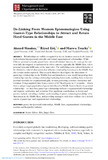- CERES Home
- →
- School of Management (SoM)
- →
- Staff publications (SoM)
- →
- View Item
JavaScript is disabled for your browser. Some features of this site may not work without it.
| dc.contributor.author | Shaalan, Ahmed | |
| dc.contributor.author | Eid, Riyad | |
| dc.contributor.author | Tourky, Marwa | |
| dc.date.accessioned | 2021-08-23T13:37:44Z | |
| dc.date.available | 2021-08-23T13:37:44Z | |
| dc.date.issued | 2021-07-15 | |
| dc.identifier.citation | Shaalan A, Eid R, Tourky M. (2021) De-Linking from Western Epistemologies: using Guanxi-Type relationships to attract and retain hotel guests in the Middle East. Management and Organization Review, Volume 18, Issue 5, October 2021, pp. 859-891 | en_UK |
| dc.identifier.issn | 1740-8776 | |
| dc.identifier.uri | https://doi.org/10.1017/mor.2021.21 | |
| dc.identifier.uri | http://dspace.lib.cranfield.ac.uk/handle/1826/17031 | |
| dc.description.abstract | Relationships are widely recognized as key to business success in the form of both informal interpersonal networks and formal organizational relationships. While Chinese personal networks (guanxi) have attracted scholars’ interest, the concept has not been fully investigated or understood in other contexts, especially the Middle East, where personal networks fulfill some of the same roles. The underlying socio-cultural formulae of the distinctive cultural dimensions that influence relationship formation in the Middle East also remain under-explored. This research therefore investigates the dimensions of guanxi-type relationships in the Middle East and introduces a new model integrating these relationships into the existing relationship marketing framework, enabling firms to harness personal networks for organizational gain, in turn generating customer satisfaction and retention. Using empirical data from a survey of 637 hotel guests in 17 countries – drawn from a unique target population of guests introduced to Middle Eastern hotels via personal relationships – we show how guanxi-type relationships influence organizational relationships and improve satisfaction and retention. Our significant contributions to theory and practice include extending a holistic understanding of guanxi, enhancing knowledge of its dimensions in the Middle East, and providing managers with clear evidence for a hybrid system of guanxi-type and organizational relationships. | en_UK |
| dc.language.iso | en | en_UK |
| dc.publisher | Cambridge University Press | en_UK |
| dc.rights | Attribution 4.0 International | * |
| dc.rights.uri | http://creativecommons.org/licenses/by/4.0/ | * |
| dc.subject | tourism and hospitality industry | en_UK |
| dc.subject | organizational relationships | en_UK |
| dc.subject | Middle East | en_UK |
| dc.subject | interpersonal relationships | en_UK |
| dc.subject | guanxi | en_UK |
| dc.title | De-Linking from Western Epistemologies: using Guanxi-Type relationships to attract and retain hotel guests in the Middle East | en_UK |
| dc.type | Article | en_UK |
Files in this item
The following license files are associated with this item:
This item appears in the following Collection(s)
-
Staff publications (SoM) [1260]

